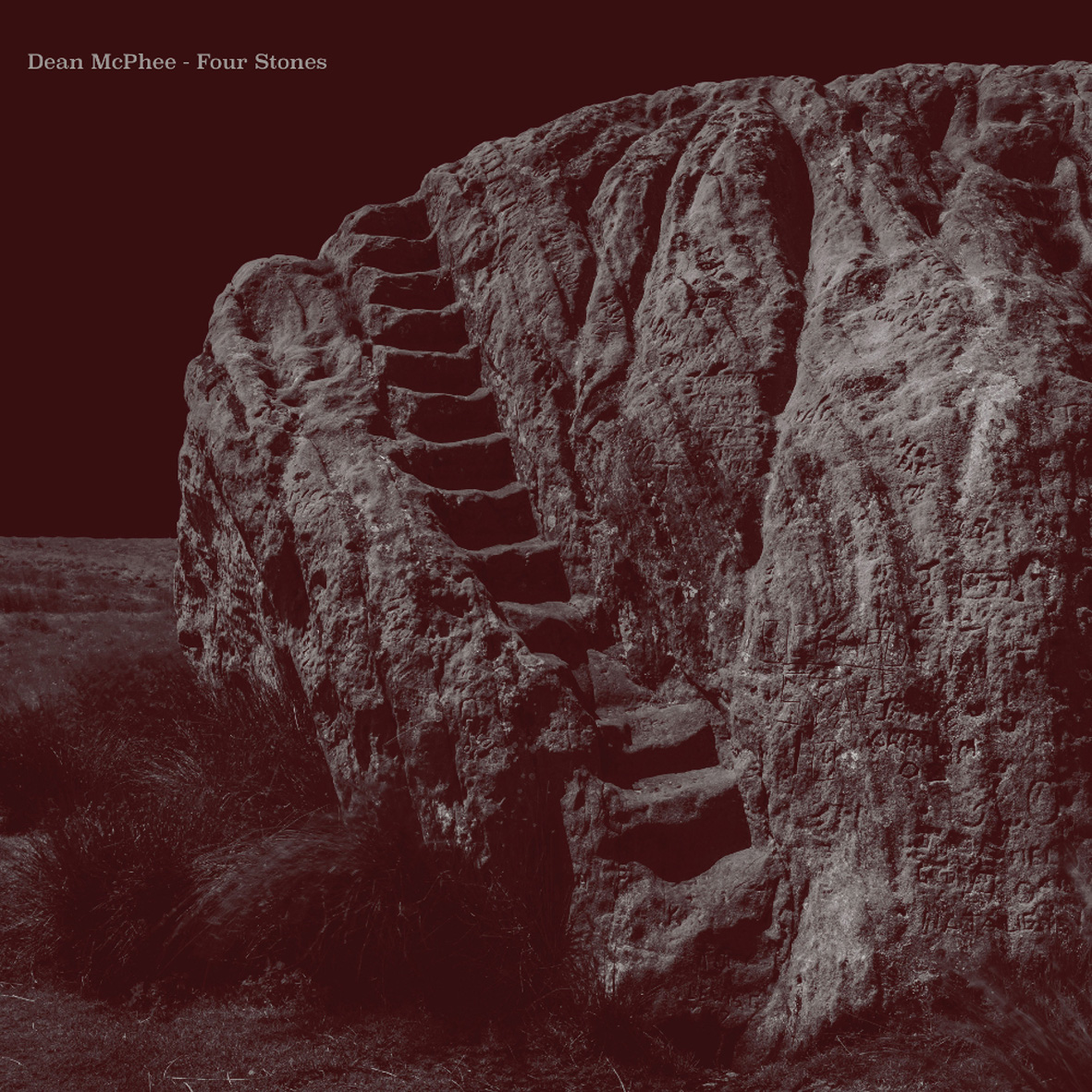Dean McPhee, "Four Stones"
 Over the course of the last decade, Dean McPhee has quietly and unhurriedly established himself as one of most compelling and unique solo guitar artists around, weaving gorgeously meditative reveries with a masterful use of ghostly delay effects. This latest album, his first since 2015, compiles remastered versions of three pieces that have surfaced on several elusive Folklore Tapes collections, as well as a pair of new pieces. All are characteristically fine, but both "The Devil’s Knell" and the epic "Four Stones" rank among the most mesmerizingly sublime work that McPhee has yet recorded, making this his most essential album to date.
Over the course of the last decade, Dean McPhee has quietly and unhurriedly established himself as one of most compelling and unique solo guitar artists around, weaving gorgeously meditative reveries with a masterful use of ghostly delay effects. This latest album, his first since 2015, compiles remastered versions of three pieces that have surfaced on several elusive Folklore Tapes collections, as well as a pair of new pieces. All are characteristically fine, but both "The Devil’s Knell" and the epic "Four Stones" rank among the most mesmerizingly sublime work that McPhee has yet recorded, making this his most essential album to date.
Hood Faire
The opening "The Blood of St. John" dates back to Folklore Tapes' 2016 homage to midsummer traditions, Crown of Light.In many ways, it is a quintessential Dean McPhee piece, as it feels like a kind of transcendent, slow-motion blues that unfolds over a bleary haze of shimmering delay.Even that description is exasperatingly reductionist though, as McPhee's crystalline cascades of serpentine melodies seamlessly pull in shades of more exotic influences from Mali and Morocco to reach towards something far more ecstatic than a mere guitar solo.The following "Devil’s Knell" also originates from one of Folklore Tapes' seasonal collections (Midwinter Rites and Revelries), but takes a more languorous and drone-influenced approach, capturing McPhee's work at its most achingly gorgeous.It initially takes shape as a lovely, glimmering fog of shivering chord swells before unexpectedly blossoming into a tumbling descending melody evanescently trailed by a ghostly afterimage.That tactic has sparingly surfaced before on other Dean McPhee records and it remains his most dazzling trick, as the overlapping and out-of-phase doppelganger melody is beautifully disorienting and creates a wonderfully dreamlike wake of hanging overtones.The album's first side draws to a close with yet another Folklore contribution, "Rule of Threes," borrowed from their 2012 collection devoted to the Pendle Witch Trials of 1612.While it is unmistakably a Dean McPhee song due to its chiming clarity and dreamily time-stretched pacing, it also clearly harkens back to an earlier phase in his evolution, as it is much more structured and conventionally melodic than his recent work.It is neither better nor worse for that, yet it feels more like a fantasia on an existing piece of traditional music than something that is spontaneously and intuitively conjured into being.
That said, the newer "Danse Macabre" is also quite structured, as it is built from an obsessively looping and rippling minor key arpeggio.I doubt anyone could ever mistake it for an appropriated piece of traditional music, however, as that one chord endlessly loops in hypnotic stasis and gives the piece a strangely lagging and off-kilter pulse that creates a disorienting sense of unreality.Over the top of that unusual backdrop, however, McPhee unfurls a sleepily lovely and melancholy glissando-heavy melody.The odd, frozen-in-time looping structure of "Danse Macabre" makes it feel more like an interlude than one of the album's more substantial pieces, but it is certainly a beguiling one.McPhee saves his best and most ambitious work for last though, as the title piece is a slow-burning and gently pulsing epic that transforms from one gently simmering motif to another as it builds towards its climactic final theme.Notably, "Four Stones" makes prominent use of a new element in McPhee’s palette: a bass drum.It is used so subtly that it is easy to forget that it is even there, but it sneakily gives the piece a somewhat more muscular pulse than he would have gotten solely from looping bass notes.Overall, it is quite an impressive work both compositionally and performance-wise, given that everything is performed live with no overdubbing: McPhee nimbly alternates between different textures (clean melodies, feedback-swathed sustained tones, and ringing harmonics) while simultaneously maintaining a strong central thread, sneaking in occasional chord changes, and keeping a steady kick drum pulse with one of his feet.It is quite a juggling act.Nevertheless, all of that is merely the pleasantly absorbing prelude to the quietly dazzling final movement, as a glacially descending cascade of harmonized tones coheres into a spectral and eerily beautiful dance.
That last bit nicely illustrates why I have been enraptured by Dean McPhee's work for so long (and also why he fits so seamlessly into the Folklore Tapes milieu): at any given time, there are always a handful of visionary guitarists who carve out their own compelling and distinctive niche, as well as many more who exhibit virtuosic technique or write consistently great songs.McPhee’s work checks off all three of those boxes, but his greatest moments reach another plane altogether where it feels like he is channeling something much deeper, more timeless, and almost supernatural.It is amusing to imagine some kind of ancient sorcery emerging from such modern gear as a Telecaster and some echo and delay pedals, but it is also easy to imagine McPhee being tried as a witch if he had gotten these sounds out of a stringed instrument in Pendle circa 1612–there is a layer beyond mere melody and harmony here that feels like time itself is blurring and the veil of reality has partially dissolved to offer a glimpse of something more mysterious.Needless to say, that sublime feat of illusion appeals to me immensely.This album is wonderful.
 



